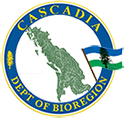KAHKWA
[KAH’-kwa] — adverb, conjunction.
Meaning: Alike; like; similar to; equal with; as so; as also; even as; thus, such, hence, because, inasmuch; ‘accordingly; like, resembling’.
Origin: Chinookan kákwa ‘thus” > Nootka Jargon kwokwokwa ‘like (this)’ > Makah Nookta qwa- ‘to be thus’
It is generally associated with sameness or similarity to something, as evident in “kahkwa egg” (oval). If something is as expected, it might be described as “kahkwa spose” (as if; it appears; seems to be) or as “kwonesum kahkwa” (regular). Of course the opposite of this would be if something was “wake kahkwa” (unequal).
The expression “kahkwa nika tumtum” (as I think; so I think), literally means “such [is] my heart”, and ‘The Lord’s Prayer’ in the Chinook jargon ends with the expression “kloshe kahkwa” (that is right; good so; so be it; amen).
Of course it would be foolish to assume “kopet kahkwa” (that is all). Kahkwa is used to create comparative adjectives, as seen in “halo kahkwa” (not like; unlike), “yaka kahkwa” (alike; it’s like), “delate kahkwa” (exactly the same), and “kahkwa hyas” (as large as; as big as).
It is also often used to change nouns into adverbs and sometimes into adjectives, as seen in “kahkwa tillikum” (friendly), “kahkwa chuck” (fluid; liquid, like water), “kahkwa chikamin” (metallic; like metal), “kahkwa kamooks” (beastly, like a dog), and “kahkwa pil” (redish).
It can also be used to describe traits and characteristics of a person, as seen in “kahkwa tyee” (like a chief; aristocratic; kingly), “kahkwa papa” (paternal) and “kahkwa ats” (sisterly), “kahkwa klootchman” (effeminate), or describe the nature of something, as seen in “kahkwa shugah” (sugary), “kahkwa glease” (oily).



Post a comment